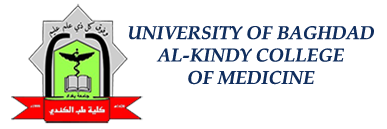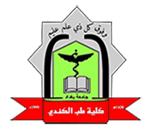History and Profile
The surgical department was founded since the founding of the college in 1998. It is considered the largest department in the college in terms of its branches and number of its staff, it starts teaching students since the 4th Year till graduation of students from the 6th. Stage, and includes the following divisions:
- General Surgery
- Orthopedics
- Ophthalmology
- ENT
- Urology
- Diagnostic Radiology
- Plastic and reconstructive surgery
- Neurosurgery
- Anesthesia
- Cardio thoracic surgery
- Pediatric surgery
The Vision:
The department of surgery operates that after graduation of the student that he will be able to perceive and understand the science of all types of surgery in theory with the ability to understand surgical solutions for all situations, and of making surgical skills for emergency and daily cases that is needed by the patient in the surgical ward taking into account the professional ethics and respect for patients’ rights and confidentiality and privacy.
The Message
The message of the department surgery is on the development of surgical capacity of the student and creates a balanced doctor, ambitiously placed in the service of the patient and his interests and maintaining its integrity in the choice of surgical solutions and cooperation with fellow doctors in all specialties to create an atmosphere and environment aimed at the patient’s health and interests.
Future Vision
Make the student during his study the science of surgery and in all stages and after graduating distinct from his colleagues in other medical schools and create a spirit of fair competition and ambition for groups excellence and emphasis on medical education and scientific research and find the best solutions and the shortest to reach the goal is the health of the individual in society.
Objectives
- To provide students with basic knowledge and capabilities and skills in various clinical specialty surgeries.
- To Provide students with the basic knowledge and skills required to deal with various emergency surgical cases in the unite of emergency.
- To provide students with the knowledge and capabilities required to deal with cases of trauma, multiply injured patients, according to the international Standards.
- Provide students basic principles required to prepare them as decision-makers.
- Guide and direct students to the latest developments in science and surgical skills.
In the second stage:
The teaching staff share to teach anatomy of chest, cardiovascular systems, upper and lower limb anatomy nose throat and larynx anatomy.
The also responsible and share for the early clinical exposure module for the second stage.
In the third stage:
the teaching staff share to teach the module of renal module.
They share in responsibility and learning of early clinical exposure for the third stage.
In the fourth stage:
The department teaches the students the basic principles of surgery including diseases of all systems:
Theory 93 lectures repeated twice in the year. Also, the department teaches the students clinical knowledge including history and examination of patients for 8 weeks (110 hr.) and this repeated four times in the year: two in the first semester and two in the second semester. A log book is distributed for the students which contain activity to be done by students including for continuous assessments:
- Proper case sheet writing regarding history and examination.
- Proper case presentation
- Continues assessment
Clinical skills:
- Gluteal intramuscular injection.
- Subcutaneous injection.
- Attitude Assessments format.
In the 5th year:
The Module will be taught along 16 weeks which is repeated twice a year. The surgery module will include six main disciplines that are: General surgery, Orthopedics, ENT, Ophthalmology, Diagnostic Radiology, and short postings (neurosurgery, cardiothoracic surgery, plastic surgery and anesthesia) with the main emphasis given to skills teaching of these clinical science.
Besides the dedicated lectures and practice, students will be trained to interact with lecturer in tutorials and prepare seminar presentations.
Student’s progress will be monitored through continuous assessments that include attitude Assessments, quizzes, tutorials, seminars, log book and end module examination. The students will also be required to give their feedback on the course delivery through an evaluation form. The total assessments in the form of first professional examination will be done at the end of the module.
In the sixth stage (stager):
The students are trained in the wards of Al-Kindy teaching hospital and over 12 week on the practical application of all branches of surgery that addressed during the last two years. During his clinical work he uses to do:
- Evaluation and examination of surgical cases and participate in the diagnosis and the treatment.
- Provide seminar under supervision of teachers.
- Training on clinical cases in the medical laboratory skills.
- Accomplish the requirements of the practical applications of the log book.
Family medicine Diploma:
The teaching staff tend to share in giving lectures and training the candidate of family medicine diploma regarding General surgery, Orthopedic surgery, ENT, Ophthalmology and Emergency surgery.
Candidates of Arab and Iraqi board of surgery:
Many of the teaching staff are supervisor and trainers for candidates of Arab and Iraqi board of surgery regarding general surgery and orthopedic surgery and supervisor for the training for different surgical subspecialty candidate during their training in general surgery training courses.
Skills laboratory:
Training of the students in different stages and mastering different skills that they need in the near future as doctors working in the surgical wards and Emergency and trauma by utilizing the appliances and different teaching tools , simulators , as well as training of Arab and Iraqi board candidate on simulators of laparoscopic surgery utilizing the simulators the skills laboratory.
| Name | CV | Specialty | Title |
|---|---|---|---|
| Ghadeer Hakeem Majeed Shuman Shuaib | CV | Orthopedic Surgery and Fractures | Professor |
| Tawfiq Jassim Mohammed Ali Al-Marzouki | CV | General Surgery | Professor |
| Bassam Mahmoud Flamarz Ahmed Arkwazi | CV | Neurosurgery | Professor |
| Hussein Jassim Mohsen Hassan Al-Saadi | CV | ENT | Associate Professor |
| Raed Eshtephan Rizkallah Abdul-Ahad Rasim | CV | General Surgery | Associate Professor |
| Malath Anwar Hussein Ahmed Masjoun | CV | Urology | Associate Professor |
| Abdul-Hadi Laibi Shamkhi Ali Al-Rabiee | CV | Gastroenterology | Professor |
| Susan Amanat Ratan Laibi Al-Ziaei | CV | Ophthalmology and Ophthalmic Surgery | Professor |
| Qais Ahmed Hassan Saleh Al-Tamimi | CV | Diagnostic Radiology | Associate Professor |
| Haidar Rahim Nimah Abdul-Razzaq Al-Zubaidi | CV | Cardiothoracic and Vascular Surgery | Associate Professor |
| Ali Adnan Yousef Mohammed | CV | Neurosurgery | Associate Professor |
| Harith Mohammed Qanbar Mahmoud Al-Sadaawi | CV | Urology | Associate Professor |
| Karim Assi Kazem Houshy Al-Sarraj | CV | Anesthesia | Lecturer |
| Mohammed Abdul-Hussein Laftah Hassan Al-Khoda | CV | Orthopaedic Surgery | Lecturer |
| Sary Lu'ay Kazem Mohsen | CV | Ophthalmology and Ophthalmic Surgery | Lecturer |
| Haider Omar Hayat Alab | CV | Orthopedic Surgery and Fractures | Lecturer |
| Shimaa Khalid Abdul Qadir | CV | Diagnostic Radiology | Lecturer |
| Naba Aswad Shaker Mohsen | CV | Diagnostic Radiology | Lecturer |
| Ali Abdul Kareem Abbas Hussein | CV | Ophthalmology and Ophthalmic Surgery | Lecturer |
| Saja Ali Ahmed Abdul-Hussein | CV | Diagnostic Radiology | Lecturer |
| Ali Falah Zebalah | CV | Orthopedic Surgery and Fractures | Lecturer |
| ِAli Adnan Dolachee | CV | Neurosurgery | assistant professor |
| Rehab Mohammed Eidan Shaab Al-Qaisi | CV | Nursing Sciences | Lecturer |

